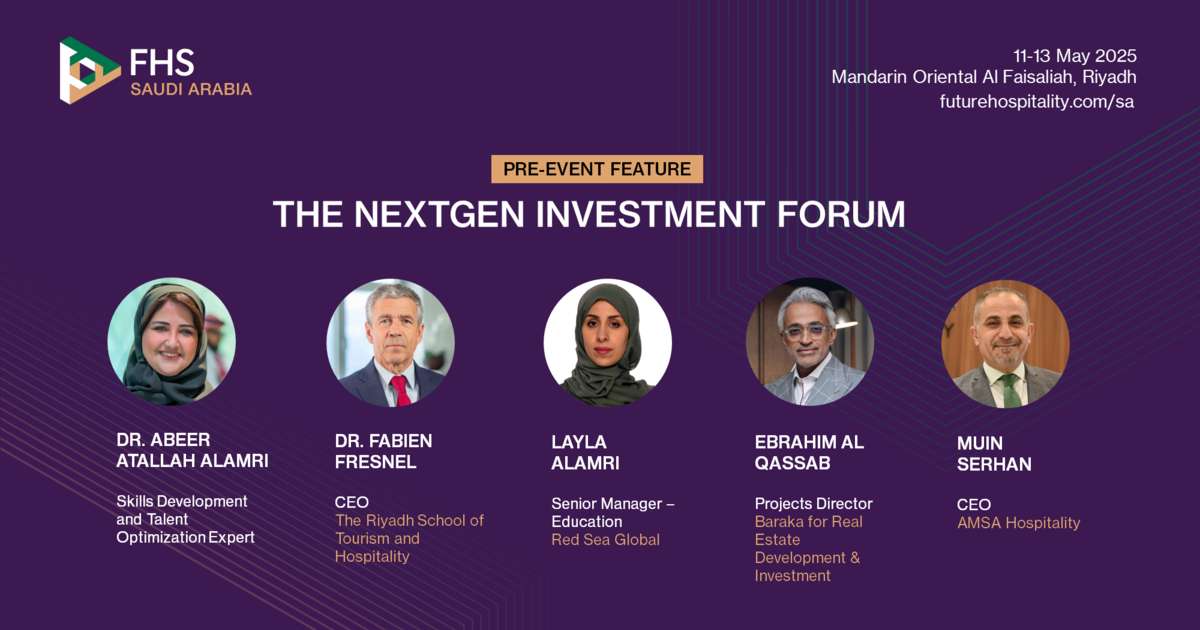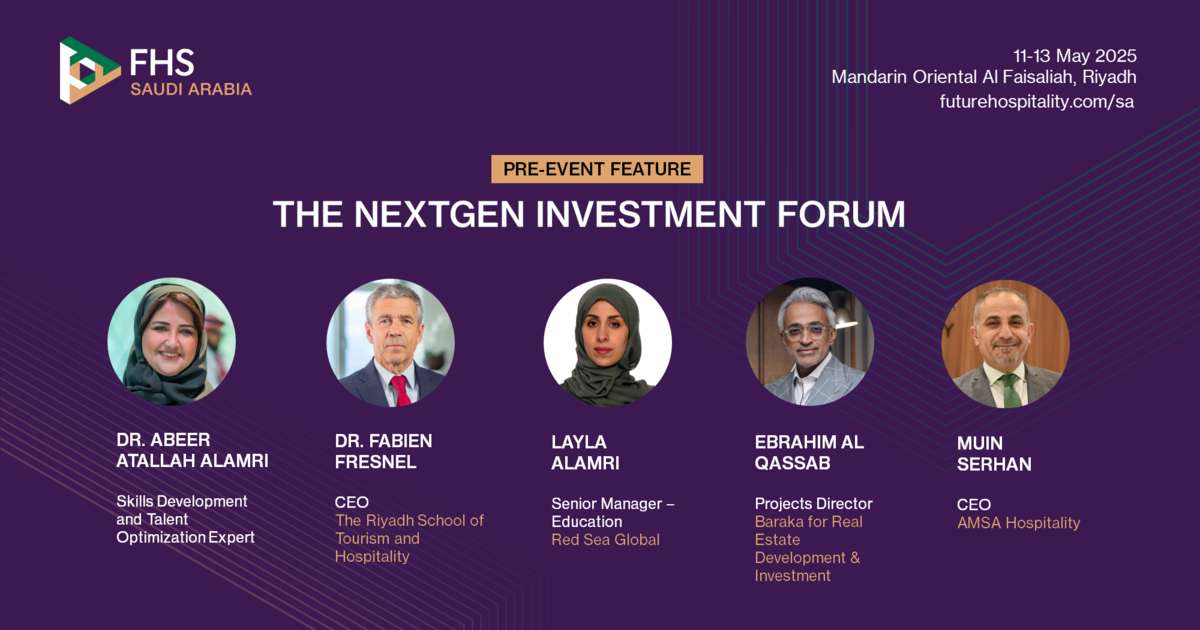
With 1 million new tourism jobs predicted by 2030, the Kingdom’s hospitality sector is facing some critical challenges. First, notable skill gaps are evident in specialised areas like hospitality management, digital competencies, and vocational training in tourism. Second, only 8.1% employed in the Saudi tourism industry are women, and third, Saudi Arabia’s youth unemployment rate remains around 16%, with limited vocational pathways in hospitality for young Saudis.
With FHS Saudi Arabia just around the corner, I asked leaders from Amsa Hospitality, Baraka Real Estate Investment & Development, Riyadh School of Tourism & Hospitality, Red Sea Global and Dr. Abeer Atallah Alamri, Skills Development and Talent Optimization Expert for their insights into the challenges, purpose and approach behind investing in the next generation of hoteliers.
How important is investment in hospitality education to develop the next generation of leaders? What challenges does the industry have to overcome to develop meaningful strategies and programmes in this regard?
According to Dr. Abeer Atallah Alamri, investment in hospitality education is crucial for cultivating future leaders by equipping them with essential skills, knowledge, and a professional mindset. Challenges include bridging the gap between academic curricula and real-world industry needs, attracting students amidst perceptions of long hours and lower pay, and securing adequate funding for quality programmes and resources.
Dr. Fabien Fresnel, CEO at The Riyadh School of Tourism and Hospitality said, “There is no tourism strategy if there is no talent capability building strategy. Building programmes is not the issue. Making the industry aspirational is one: attracting. Delivering the proper training in the proper format and leveraging technology with relevant content: educating. Making sure the industry is providing career perspectives and sustaining the training and development effort throughout: retaining. Attracting, relevant training, retaining = tri-dimensional equation.”
Layla Alamri, Senior Manager – Education at Red Sea Global added, “As the hospitality sector experiences rapid growth in Saudi Arabia, a key challenge is building a strong pipeline of talent. To address this, we have launched a series of training initiatives to empower young Saudis with the skills they need to thrive, with many graduates securing employment with the company. This includes educational, vocational and on-the-job training, with 1,995 students benefitting since 2019.
Industry leaders sometimes struggle to pinpoint the real barriers to attracting and retaining next-generation talent. Ebrahim Al Qassab, Projects Director at Baraka Real Estate Investment & Development believes that the struggle comes from viewing talent attraction as a recruitment issue rather than a cultural one. “Many leaders focus on incentives but miss the deeper emotional and intellectual needs of today’s generation. Young professionals aren’t just looking for jobs – they’re seeking purpose, ownership, and alignment with values. At Baraka, we redefined this challenge by embedding one of our core pillars: catering for the dreamers. We actively try to inject this spirit into Baraka’s DNA by involving talent in shaping our workspaces and communities. When people see their identity and aspirations reflected in the environments they help create, they stay not out of obligation, but out of passion.”
How can the industry attract – and retain – the talent that is needed to turn Vision 2030 into a reality?
“Attracting and retaining talent for Vision 2030 requires the industry to offer competitive compensation and benefits, foster a positive work culture with opportunities for growth and development, and promote the sector as a dynamic and rewarding career path. Highlighting the industry’s contribution to national goals and offering specialised training programmes are also vital,” said Dr. Abeer Atallah Alamri.
Layla Alamri added, “Attracting and retaining talent requires more than just competitive salaries. Employees need to feel a sense of ownership and purpose. In our case, this means ensuring that our employees are aware of the importance of their work to the future of the Kingdom, diversifying the economy and putting it firmly on the global tourism map.”
Dr. Fabien Fresnel believes that the industry has a critical role to play. “It needs to trigger aspirations, deliver the proper messaging, manage youngster’s expectations, and offer an entrepreneurial mindset in a corporate environment.” He went on to say, “I think Saudi Arabia has the intelligence, the expertise and the financial means to implement a nationwide educational strategy to meet the Kingdom’s goals. It goes with building capabilities, and this can be done fast, delivering programmes and training efficiently. I don’t see any roadblocks to do that if there is willingness and fire power.”
Will strategic partnerships between private academies, government entities, and universities transform human capital development in Saudi Arabia’s tourism and hospitality sectors?
“Since its launch, Amsa Hospitality Academy has signed agreements with some of the best universities and colleges across the Kingdom. One notable collaboration is with King Khalid University which allows recent graduates to enrich their academic learning with real-world practical experience. The first cohort is currently undertaking training at the brand-new Mercure Khamis Mushait and has experienced the dynamic operations of a hotel pre-opening phase. Other agreements include those with Princess Noura University and King Saud University. Moreover, we recently welcomed the Deputy Governor for Training Policies and Quality to our premises for an overview of ongoing training programmes that endow students with the required knowledge to pursue successful career paths,” said Muin Serhan, CEO at Amsa Hospitality.
Layla Alamri added, “Strategic partnerships are vital for knowledge-sharing and innovation. Our scholarship programmes with the University of Prince Mugrin and École hôtelière de Lausanne are designed to equip young Saudis with international hospitality management skills. Drawing on the universities’ technical and educational expertise, we are preparing future leaders to contribute directly to Vision 2030.”
What is your organisation doing in terms of education investment, particularly when it comes to developing Saudi citizens for roles in hospitality and tourism?
Dr.Fabien Fresnel, said, “The purpose of The Riyadh School of Tourism and Hospitality and its affiliates is to serve the country and the younger generations, help KSA pivot part of its economy towards tourism, deliver outstanding customer journeys to trigger repeat business, and overall ensure a bright future for millions of young Saudis whose pride will only be exacerbated as the industry grows.”
Amsa Hospitality has its own vocational training academy, Amsa Hospitality Academy. “We launched last year in collaboration with the globally recognised Luxury Hotelschool Paris. Our mission is to help aspiring Saudi hoteliers develop the skills needed to excel in the hospitality industry. The academy is open to everyone, not only prospective employees of properties managed by Amsa Hospitality, commented Muin Serhan.
“Investing in people is key to our regenerative tourism vision. Our Elite Graduate Program – now in its sixth edition – enrols Saudi graduates into a comprehensive system of placements and training programmes. We have also established a number of vocational education programmes to equip local talent with the skills to support the growing Saudi tourism sector. Our goal is to empower Saudi men and women, so they excel and drive Vision 2030 forward,” said Layla Alamri
Meanwhile, Ebrahim Al Qassab commented, “Industry leaders can create a culture where questioning traditional models of hospitality education and talent engagement is encouraged. Real innovation doesn’t come from people who all think the same. It comes from open, honest conversations, especially between generations. I’ve learned to not just include young voices, but to let them help shape the way forward. Leaders need to welcome new ideas, encourage diverse skills, and mix different fields together. At Baraka, we often bring creatives, educators, and developers into one room and that’s where fresh, relevant ideas are born. Challenging the system isn’t about breaking it, it’s how we grow and improve it.”
FHS Saudi Arabia takes place 11-13 May 2025 at Mandarin Oriental Al Faisaliah, Riyadh. On the agenda of the first day of the summit, the NextGen Investment Forum aims to address the challenges of future hoteliers on several fronts by building a community of educators and industry experts, creating pathways to career growth, bridging the skills gap, empowering Saudi nationals, and fostering public-private collaboration.
Anne Bleeker
In2 Consulting
+971 56 603 0886
The Bench
Please visit:
Our Sponsor
